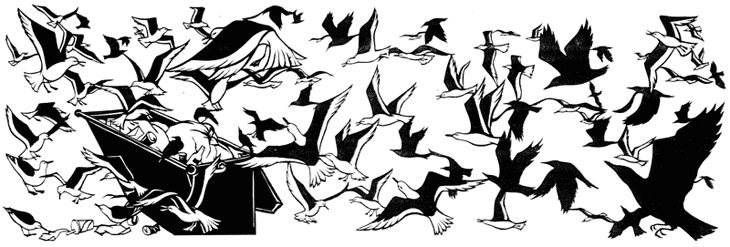Image: Nikki McClure
A great call for papers from Hannah Stark and Arun Saldanha, for a special issue of Deleuze Studies.
Deleuze and Guattari in the Anthropocene
Twenty years after his death, Deleuze’s thought continues to be mobilised in
relation to the most timely and critical problems society faces. As theory is starting
to reconcile itself with a grim environmental future and with the emergence of the
Anthropocene as a key conceptual framework, we are compelled to consider the
philosophical consequences of the irreversible and profound impacts of
industrialisation and consumerism on environments at a planetary scale. The
Anthropocene disrupts thought itself, requiring that we re-evaluate the human and
its place in the cosmos: a third Copernican Revolution. It is widely accepted now
that the human species is itself a geological force. Any erstwhile conceptual gap
between human and natural history has more or less collapsed. The question
whether there could be a “good” or “bad” Anthropocene endows humans with an
immense and unprecedented agency in their relationship to the earth, positioning
us as accountable for past actions and inactions and future generations. We should
beware that this moral dimension tends to offer little more than a biblical version of
human stewardship as ostensible solution for the catastrophic futures scientists are
alarmed about. It has precisely been such selfish anthropocentrism, and its most
vicious avatar, capital, that landed the species in this predicament in the first place.
If the risks embedded in the Anthropocene conceptually unify the human as a
species desiring food, energy, art, and a minimum of groundedness, it also brings
into relief the ways in which a violent earth further fissures the species along
economic, racial and sexual axes. Anthropocene anxiety manifests itself variously in
reassessments of the entanglements of the human and the nonhuman, the
continuing breakdown of the subject/object distinction, the mania apparent in the
plans for geo-engineering, and increasingly popular rethinking of the human body
in the context of becomings-animals, -plant and -mineral. The Anthropocene
likewise reminds us of the necessity to think at more-than-human timescales. It has
required that we consider deep time as well as vast space, reflecting in the process
on the inevitability of human extinction and the conception of a world without us.
What worlds are there before, beyond and after human time and thought?
In philosophical debates, the Anthropocene has seen an invigoration of cultural and
ethical theorizing through the “posthumanist” redeployment of phenomenology,
deconstruction, psychoanalysis, philosophy of science and literary theory. What
might the significance of Deleuze and Guattari be in relation to this new and
urgent set of concerns? Deleuze’s work presaged much of the concept of the
Anthropocene, not only in his sustained challenges to humanism, anthropocentrism
and capitalism, but also through his interest in geology and the philosophy of time.
Guattari was keen on giving his work an “ecosophical” and “cartographical”
dimension. Together, they posited a “geophilosophy” which called for a “new earth”
along with “new peoples”. Not only does the work of Deleuze and Guattari offer a
range of useful concepts that can be applied to contemporary problems such as
anthropogenic climate change, peak oil and biotechnology, but it also models the
kind of interdisciplinarity that the new epoch of the Anthropocene requires.
This special issue of Deleuze Studies, “Deleuze and Guattari in the Anthropocene”,
will engage the many philosophical tools provided by Deleuze and Guattari and
their interlocutors in order to critically approach our particularly tense moment in
earth history, while also asking how this moment could change the ways they are
read and further developed into the future.
We invite considerations of Deleuze, Guattari, or Deleuze-Guattari in relation to
the Anthropocene from scholars working in any discipline. Contributions should be
6-8000 words in length and use the journal’s style. Abstracts are due on the 1st of
March 2015, decisions will be made by the 15th of March, and final essays due on
the 1st of November 2015. Articles will then be subject to double-blind peer review
and will be published in 2016.
Please address queries to the editors:
Hannah Stark, School of Humanities, University of Tasmania (Australia)
[email protected]
Arun Saldanha, Department of Geography, Environment and Society, University of
Minnesota (United States)
[email protected]






“CFP special issue “Deleuze Studies”: Deleuze & Guattari in the Anthropocene” http://t.co/sCCYvwNxzT (from Hannah Stark & Arun Saldanha)